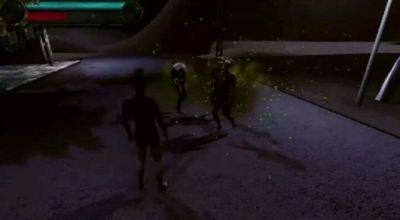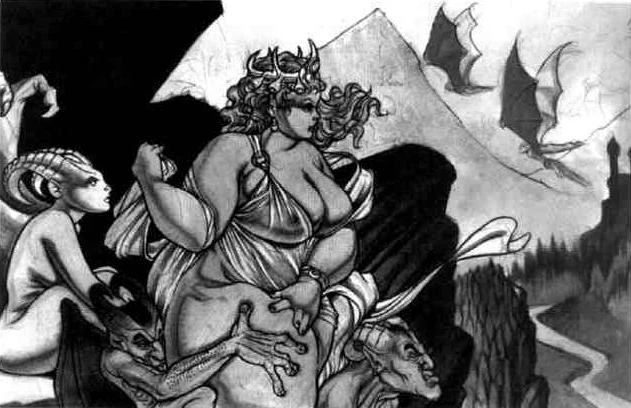-
Vampire The Masquerade Diablerie카테고리 없음 2020. 1. 24. 09:34

Vampire: The Masquerade - Bloodlines – Message Board. On a side note, if you want to make a Tremere immune to blood bond, save yourself the 3 freebie points and simply bond yourself to another non-Tremere vampire (ideally in a mutual bond). Vampires can only be bound to one regent at a time, so you'll be immune to any future attempts to bond you. The clans are the major vampire lineages that comprise vampiric society. Like all bloodlines, each clan has greater familiarity with a set of three Disciplines, a weakness largely unique to its members, and various stereotypes attributed to it as a result of a tendency to Embrace individuals.
A Taste That's To Die For.Diablerie - the anathema of the Camarilla. The law cannot be broken. The bane of all powerfull vampires.
The temptation of all neonates. To drink the blood of your elders is to gain their power, but it is also to risk destruction. Who can resist the sweetest vita off all?Over and Over AgainDiablerie combines the most dangerous adventures ever published for Vampire: The Masquerade: Awakening and Bloody Hearts.

Finally, characters have the chance to taste the blood of the Methuselabs - and gain immeasurable power!But at what price? There are worse things than Final Death.Diablerie features:. Two of the first Vampire story supplements combined under one new cover.
Vampire The Masquerade Redemption Diablerie
Complete stories about the hunt for the dreaded Methuselahs, and the chance to diablerize!. A look at Gehenna and how diablerie hastens its coming. Adobe DRM-protected PDFThese eBooks are protected by Adobe's Digital Rights Management (DRM) technology. To use them, you must activate your Adobe Reader software. Click for more details.Watermarked PDFThese eBooks are digitally watermarked to signify that you are the owner. A small message is added to the bottom of each page of the document containing your name and the order number of your eBook purchase.Warning: If any books bearing your information are found being distributed illegally, then your account will be suspended and legal action may be taken against you.Here is a sample of a page from a watermarked book.
So if you're in a game and you manage to stake an elder vampire who is several generations lower than you if you diablerize him you only get a bump of 1 generation. This seems inefficient. So I ask the question why not create a ladder to success through mutiple embraces.This following scenario is based on a 13th generation player character staking an 8th generation elder and no one finding out for a few days.Step one: Stake elder keep him in a hide out.Step two: Take an expendable blood doll or random person off the street and feed him to said elder or just kill him. Then you cut the elders wrist and use that blood to embrace the random schuck. That person is now a newborn generation 9 vampire.Step three: Diablerize newly created generation 9 vampire thereby rasing your generation up one.Step four: Repeat steps 2 and 3 until you are generation 9.Step five: Repeat step 4 for the rest of your coaterie.Step six: Use that one blood magic ritual that lets everyone share the diablerie to diablerize the elder and your entire coterie becomes generation 8.Now this theoretical exercise maximizes the profit from one elder and allows everyone to become gen 8 even if they all start at gen 13.
Obviously this would induce a great deal of humanity lost from all the soul sucking and murder. However if you're evil enough to do it, My question is there any reason this wouldn't work?. There is room for growth. Stories can explore a person rising above their circumstances or being corrupted by them, straining for / failing to achieve / achieving Golconda, forming a dynasty, gaining power in a city or losing it, gaining power in Kindred society or losing it, participating in a siege against foreign cities or defending from within them and all that goes with that, and always the XP clock keeps ticking up.Diablerie is supposed to be fraught. Really, only Sabbat Packs and Assamite cells should be trying to pacman munch their way towards Caine. To everyone else it should form a visceral horror - not only to the person who has done it and now feels a foreign presence behind their eyes and fuelling new Disciplines, but to everyone around them, because it reminds players of the simple social pact inherent in every Kindred society - a thin veneer of respectability and morality that prevents a complete, Hobbesian 'state of nature' where Kindred feeds on Kindred until one mindless survivor is left standing.

Wouldn't that just be another kind of Gehenna?. I should clarify that I'm not a Masquerade player, so I don't have the background to judge the game properly (hence the question).It seems to some extent that what generation a Vampire is matters a lot, and without diablerie, there is no overcoming or changing that, no?It sounds like generation might be less relevant than Arete is in Mage, so your point is a great one. In Mage, my Arete (Enlightenment if a Technocrat) determines how high I can raise spheres (disciplines in Vampire). Generation is definitely not equivalent to some sort of 'power level.' While a 7th Generation Kindred has the potential to raise statistics to levels a 13th Generation vampire cannot, the 13th Generation character could have a far more diverse set of abilities. Plus, while personal power is great, temporal power tends to be far more useful.A lower-generation Kindred can store more blood points and spend more per turn than their higher-generation counterparts, but that really only matters in combat. A smart vampire can negate those advantages with careful planning.
A lower-generation Kindred can store more blood points and spend more per turn than their higher-generation counterparts, but that really only matters in combat. A smart vampire can negate those advantages with careful planning.I admire this explanation, and I am sure it's true, but the part that sticks out to me that I honestly believe you are under-selling is this:A lower-generation Kindred can store more blood points and spend more per turnSpecifically this:and spend more per turnI understand this does not matter in a huge array of contexts, and you note it only really matters in combat. But that's a pretty huge exception.Also, I read somewhere else about how Dominate works across generations. Is that not significant? Do disciplines have diminished abilities to work when trying to employ them against a lower-generation Vampire?There is no need to respond, and you have alleviated the worst concerns for anyone looking through the lens of another world of darkness splat. Thanks for your time, and I welcome any follow-up if you have it. Ah, yes, I forgot about Dominate for a moment there.
Dominate doesn't work on any vampires of lower Generation than the user (unless that changed in V20, but I can't be arsed to pull out my book right now.)Also, yeah, the advantage of being able to spend more blood per turn in combat is a big one, but it's also a liability because the Kindred can run low on blood (and risk frenzy!) pretty quickly. Now, in my opinion, combat should never be the focus of VtM, but my chronicle is not your chronicle and that's okay. That said, careful planning and good strategy can negate any generational advantage in a fight.Even in Mage terms, Arete isn't truly an indicator of ability.
A willworker with low Arete and one dot in every Sphere can be far more versatile than a mage who's focused on only one or two. Dominate doesn't work on any vampires of lower Generation than the userPerhaps that's a minor thing, but if I have Dominate and end up locked out of using it ever (just flat-out) on anyone of significance, that is immensely frustrating. If I can end up with more experience than a lower-generation Vampire yet be unable to use the discipline on them at all, that seems terrible to me. There might be houserule workarounds (e.g., rolling a certain dice pool depending on generation to resist instead), and another friendly user chimed in that this is the only discipline that has that limitation. So this might just be one niche thing that's still not that important.Even in Mage terms, Arete isn't truly an indicator of ability.I would dispute this more sharply. Arete matters quite a bit.

It's the core roll (and sometimes only roll) for any magickal effect, unlike Mage: the Awakening. The difference in effectiveness between one die and three dice in actually pulling off effects (especially those requiring 2 successes or more at a minimum) is huge. It's not just a mechanical thing, either, but is reflected in the flavor text/fluff about Arete. This differs from most (if not all?) of the other WoD splats, and even Mage: the Awakening in nWoD/CofD treats it differently (doing Gnosis + Sphere or an attribute + skill + sphere for a rote, etc.).Arete also caps one's ability to expand their spheres, which signals how important this stat is for exploring a core aspect of one's character.
If a Mage could go to Correspondence 5 at 1 (or 2 or 3) Arete, then perhaps Arete would matter less. Arete also would matter less if it did not factor into the dice roll for magickal effects in such a central fashion (sometimes being the only dice rolled for an effect).Honestly, these points about Mage just help show why generation is not as important as in Vampire, which is your original point.A willworker with low Arete and one dot in every Sphere can be far more versatile than a mage who's focused on only one or two.I would be much more with you on the idea of an Arete 2 mage with three 2-dot spheres compared against an Arete 3 mage with two 3-dot spheres. One-dot spheres, though permissive of a few creative uses, are extremely limited in Mage (at least relative to any other level of sphere).Anyhow, I agree on your overall point about not having the game be combat-focused. That seems quite appropriate for VtM. I think many Mage games can be that way too, although attracting the Technocracy's attention (or playing the Technocracy as protagonists) likely will involve some combat at some point.
And planning in either scenario (whether it be one's escape or masterfully eliminating one's target) is paramount there as well.
